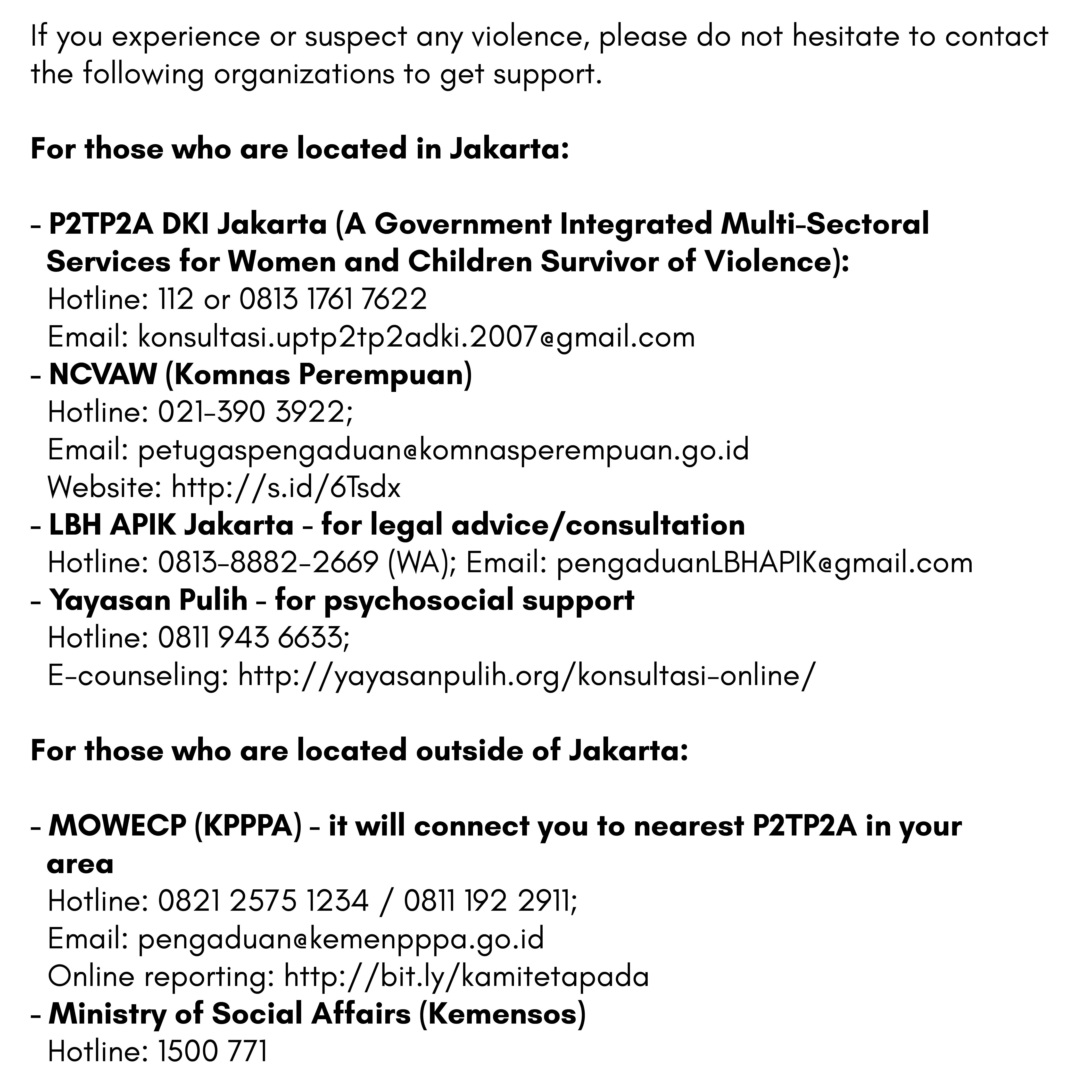Jakarta, 5 June 2020
“For many women and girls, the threat looms largest where they should be safest. In their own homes. And so I make a new appeal today for peace at home — and in homes — around the world. We know lockdowns and quarantines are essential to suppressing COVID-19. But they can trap women with abusive partners. Over the past weeks, as economic and social pressures and fear have grown, we have seen a horrifying global surge in domestic violence.“
This part of the statement made by United Nations Secretary-General António Guterres well captures the horrifying realities many women have to face during the large-scale social restriction. Epidemics have been known to cause a spike in incidents of gender-based violence (GBV), including domestic abuse and sexual exploitation, as households struggle with heightened tensions, economic pressures, and increased confinement in the homes.
During this COVID-19 pandemic, the people’s movements are largely restricted with people being confined and protection systems weakened; therefore, women and girls are at greater risk of experiencing GBV. According to the latest research conducted by UNFPA, the United Nations sexual and reproductive health agency, 31 million additional cases of GBV is expected to occur globally if the lockdown continues for at least 6 months.
Indonesia is not an exception. According to the 2016 Indonesian National Women’s Life Experience Survey (2016 SPHPN), even under normal situations, 1 in 3 women have experienced physical and/or sexual violence in Indonesia. Under COVID-19 situation, GBV cases has increased by 12% according to the recent online survey conducted by the National Commission for Violence against Women (NCVAW). The survey also points out that GBV cases under COVID-19 situation are vastly underreported, mainly due to lack of access to services as they are confined with the perpetrators at homes. Therefore, the need to ensure the GBV survivors’ access to psychological support, legal information, counseling, and referral to shelters and protection services is imminent and is a matter of strong concern.
To ensure GBV survivors can adequately access and receive the necessary services on time, UNFPA has been working closely with the Government of Indonesia. Specifically, MOWECP and Integrated Services Center of the Women and Children Empowerment (P2TP2A), are working to adjust the protocol on GBV case management and referral pathway during COVID-19 pandemic.
Now, this new protocol has been applied and utilized by officers of P2TP2A and Regional Technical Implementation Unit for the Protection of Women and Children (UPTD) in regions. Also, Sejiwa, Psychiatric Health Services which was launched on April 29, 2020, by the Office of the Presidential Staff, provides virtual support to women and children in dealing with various problems amid the COVID-19 pandemic in line with the new protocol.
“SEJIWA aims to provide support to women and children as vulnerable groups, on psychosocial problems, including threats of lowered quality of mental health, anxiety, stress or depression, caused by the economic downturn,” as expressed by the MOWECP Minister Bintang Puspayoga. Through SEJIWA psychology services, MOWECP provides assistance to women and children affected by COVID-19, such as women survivors of domestic violence, women in emergencies and special conditions, women migrant workers, women with disabilities, and children needing special protection. Between May 10 and 22, in less than two weeks, SEJIWA has received more than 200 reported cases of domestic violence, including economic, physical, and psychological abuse.
The new protocol also directs a new way of communicating with GBV survivors and their supporters. Berjarak Communication Platform, which is facilitated by MOWECP, aims to build a communication platform to share resources to ensure the fulfillment of the basic rights of women and children during the pandemic. “With the help of online volunteers, women, children, and families have access to information to protect themselves from COVID-19 infection as well as from the risk of sexual violence or domestic violence,” says Nyimas Aliah, Assistant to Deputy for the Protection of Women’s Rights in Emergency and Special Situation, MOWECP.
Women, who make up the majority of caregivers and health workers in Indonesia, are saving millions of lives while putting themselves at higher risk of becoming infected during COVID-19 pandemic. Women who work in the informal sector are at the risk of losing jobs. Thousands of women have reached out to the government services requesting support after getting physical, mental, emotional, and economic abuse from their partners. MOWECP and UNFPA continue to collaborate to ensure women are protected even under quarantine situations, and our services reach those who need them the most.
- Megumi Uchino, Humanitarian Programme Analyst, UNFPA Indonesia
-Sri Wahyuni, Gender Project Officer, Ministry of Women Empowerment and Child Protection

UNFPA, the UN's sexual and reproductive health agency, works in Indonesia and over 150 other countries globally to achieve zero maternal deaths, zero unmet need for family planning, and zero gender-based violence and other harmful practices against women and girls - a vision enshrined in the Programme of Action stemming from the landmark 1994 International Conference on Population and Development (ICPD).
To learn more about our response to COVID-19, visit www.unfpa.org/covid19
To support our lifesaving work amid the pandemic, visit https://donate.unfpa.org/th-en/covid-19


